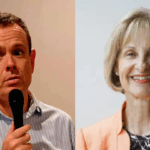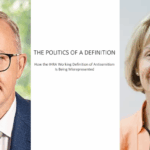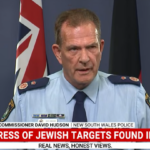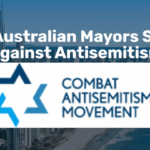The Entire Palestine Movement on Trial: Dr Nick Riemer on Fighting Antisemitism Lawfare
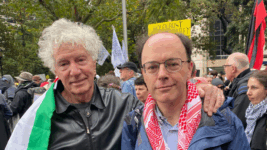
Sydney University academics Professor John Keane and Dr Nick Riemer are the next Australian pro-Palestinians being made to front up to the Federal Court, as their own colleagues lodged an antisemitism complaint against them, not for anything extreme, but simply due to their opposition to the mass murder in Gaza, and the unexceptional nature of the complaint means it could impact us all.
Keane is a professor of politics, while Riemer is a linguist. They have been vocal in their support of Palestine but the content said to have breached section 18C of the Racial Discrimination Act 1975 (Cth), is hardly hate speech and in explaining the crux of the matter, Riemer sets out that the claim draws a long bow in an attempt to smear the pair as antisemites.
Three fellow academics and two students lodged the racial discrimination complaint against the social justice advocates with the Australian Human Rights Commission last October, without any heads up. However, it became apparent that the complainants weren’t interested in the AHRC conciliation process, as they’d been eyeing off getting the academics into Federal Court.
Riemer and Keane are currently crowdfunding their legal costs via a Chuffed page. Despite the unofficial prohibition on speaking out against the Gaza genocide and showing support for the Palestinians that has gripped the public sphere for the past two years, civil society support for the pair has been overwhelming. Yet, Riemer stresses the costs of running such a case is ridiculous.
Sydney Criminal Lawyers spoke to University of Sydney linguist Dr Nick Riemer about the reasons why Zionists are employing these lawfare tactics and the advantage they see in getting the prominent academic pro-Palestinian supporters into the Federal Court, along with his understanding that the way forward in opposing Gaza lies with the Sydney Harbour Bridge march.
In October 2024, three of your fellow Sydney University academics and two students lodged a racial discrimination complaint against you and Professor John Keane with the Australian Human Rights Commission, claiming you’ve both been partaking in racist hate speech, specifically antisemitism.
Nick, both you and the professor vehemently deny these claims. So, what is the content of the claim, and what are you both said to have done? And why have these people singled you two out?
There is nothing that we have done or said which is any different from what countless other people have done or said since October 7, 2023. I hope that soon the court documents will be made public so people can take a look at the claims themselves.
The claims boil down to the suggestion that when we are criticising Zionism, really we are using Zionist as a codeword for Jew, and we are doing that because we are antisemites. That is the substance of the claim. It is obviously a very serious accusation, and a completely false one.
They’ve targeted us for several reasons:
One is that neither John nor I is Palestinian or Jewish, so neither of us bring the complications that those identities would carry with them.
Another is that we are at Sydney Uni, and the university is listed as a co-defendant in the complaints, so the complaints don’t only come after us, but they’re also going after the university, presumably for having allowed us to say what we have said or not having taken appropriate action against us.
Ever since the Sydney University Gaza Solidarity Encampment, the organised Israel lobby has been out to get vice chancellor Mark Scott and Sydney University.
Going after us is a way of doing that, because John and I are prominent Palestinian activists on the Sydney University staff. So, that is what is behind it.
Professor Keane and you are not the only ones who’ve been singled out for such antisemitism complaints over the last two years, journalists Mary Kostakidis and Antionette Lattouf are two other high-profile examples, as well as the calling out and penalisation of Palestinian writer and academic Randa Abdel-Fattah.
So, the complaint was initially lodged with the AHRC, how is that process going?
The AHRC process has started and finished. In order to take a racial discrimination claim to the Federal Court, you have to go through the Human Rights Commission first. The Commission has two options, to either conciliate the claim, in other words bring the parties together for them to agree on a course of action that is acceptable to everyone, or the Commission can terminate the claim, and if the claim is terminated, that then gives the option to the complainants to take the matter to the Federal Court.
The way it happened with us was that this complaint arrived in our inboxes in October last year. We had not been approached independently by any of the complainants: the first we knew of it was when the Commission told us that there was an official complaint against us. Thanks to our lawyers, we found out a little way down the track that our complainants had been crowdfunding to take us to the Federal Court for months and months before they even initially lodged the complaint with the Commission.
So, it was clear right from the start that their intention had always been to take us to the Federal Court. On that basis, we approached the AHRC and argued that the complaint hadn’t been in good faith, and that it was clear the complainants were just treating the Commission process as a necessary hurdle in order to get into the Federal Court. We asked the Commission to terminate the complaint, and they agreed to.
So, what is the advantage of taking the case to the Federal Court for the complainants?
There are multiple advantages for the complainants in a case like this. Going to court strings the case out and gives them the opportunity to keep it in the news. They can try to bankrupt us by requiring us to pay for expensive legal representation for the second highest court in the country in respect of a case that will be protracted and complex and that ties us up in the process for quite a long period.
As long as the matter is before the court, we are smeared as antisemites. In many ways just making the allegation and having it known that Nick Riemer and John Keane are being sued in the Federal Court for race hate is as good as the court finding in the complainants’ favour.
We are extremely confident that we are going to win. Nevertheless, there are advantages to be had for the complainants by the mere existence of the court process. And if we actually lose, that means a legal penalty for us, which is obviously highly undesirable, and a very dangerous precedent for the Palestine solidarity movement – legal confirmation that anti-Zionism is race hate.
You and Keane are long term, staunch supporters of the Palestinian cause. You published the 2023 book Boycott Theory and the Struggle for Palestine: Universities, Intellectualism and Liberation, which is about the academic boycott of Israel. And you’ve suggested that the case against you has all the hallmarks of the Israel lobby’s lawfare tactics, which it’s applied in the past.
So, what is lawfare? How has the Israel lobby been applying it in the past? And how is it being applied in Australia right now?
Lawfare is the idea that you use legal mechanisms to go after your political opponents. That is exactly what is happening to us.
The Israel lobby has form on this. They are currently doing the exact same thing to Mary Kostikidas. In the early 2010s, they went after my colleague Jake Lynch. He is still a colleague of John’s and mine at Sydney University. He was taken to the Federal Court on racial discrimination grounds by the Israel lobby in the early 2010s because he implemented the academic boycott of Israel.
That proved to be a debacle for the Zionists. Jake was vindicated in court. Their case fell apart completely. But nevertheless, it tied him up in complex and expensive litigation for quite some time.
Overseas, lawfare is a tried-and-true tactic. But it is not just limited to using strictly legal mechanisms. There is also the use of the disciplinary and code-of-conduct provisions within organisations to make complaints against Palestine advocates. That is another strategy that Zionists use, whether in hospitals or media organisations or universities or government departments or performing arts institutions, or wherever.
Since October 7, we have seen a massive increase in the number of complaints that are made about the employees of these organisations in ways that engage their internal investigative and disciplinary processes. There is an enormous amount of this going on, certainly in the university sector, but far more widely as well.
It’s not quite lawfare, but it is similar. It is the weaponisation of internal disciplinary processes and internal organisational regulations, with the pure purpose of harassing Palestine supporters. There is just an enormous amount of that going on at the moment as well.
Your case and the broader McCarthyite antisemitism witch hunt in this country is all about suppressing the understanding that Israel is carrying out the most horrendous crime in recent history. This genocide has been going on for two years now, however the horrors involved continue to escalate beyond what might have been imagined.
How do you consider the genocide in Gaza at present? What do you consider should be done?
The genocide itself is easily the most horrific episode in international affairs that I have lived through in my lifetime by a considerable margin, just because of the complete complicity and agency of the west, including Australia, in it, along with its dogged refusal to do anything to stop it.
I think many people see it this way – as a deeply horrifying, deeply inhuman and brutal expression of the most primitive violence. It is really horrific.
What should be done about it is a much more concrete question. In Australia, the demands of the Palestine solidarity movement are clear.
On a federal government level, it’s sanctions on Israel, putting an end to weapons supply, expelling the Israeli ambassador, investigating Australian IDF members who come back to Australia for war crimes and ending government support for Zionist organisations.
On a state level, it’s repealing the antiprotest laws that have been introduced, particularly in NSW, but not just there, which are designed in large part to supress Palestine activism. So, those are the demands on government.
On a civil society level, it’s a massive escalation in the BDS (Boycott, Divestment and Sanctions) campaign. So, they are all the demands.
Of course, the real question is how to achieve all that. I think the 3 August Harbour Bridge march provided us with some important lessons. It brought about a clear shift from the government in the form of the decision to recognise Palestinian statehood, which was on August 11.
Now, the Palestinians I know aren’t actually asking for the recognition of a state: they’re seeking real liberation. So, I’m highly sceptical about recognising Palestinian statehood as a step forward, but nevertheless, agreeing to take that step was a step forward in the narrow terms of the way the government thinks.
But the question for us is, what does the movement have to do to achieve those other goals, like stopping arms to Israel? The last election, where Labor spectacularly increased its majority, shows the severe limits on an electoral approach to this question, which sees the ballot box as the main mechanism of progress.
The Palestine solidarity movement does have to shift the Labor Party. The question is how. And this is where the Harbour Bridge march points to the way forward, because it showed that the political process will respond to public pressure if it is strong enough.
So, what we have to do is increase the amplitude and depth of civil society mobilisation. That means people not just coming to marches on the weekend but engaging in organising at work and in their community, for instance in their sports clubs or religious gatherings.
All of these different areas of society need to be theatres of increased mobilisation for Palestine if we are going to see meaningful action for Palestine and not just the more or less meaningless recognition of a state. The increasing involvement of unions is really critical here. People who are committed to justice for Palestine should see joining their union and advocating for Palestine solidarity measures inside it as a really important political gesture.
Up until now, there has been a lot of quite unfocused emphasis on consumer boycott actions, like boycotting Starbucks or McDonalds. These have some utility to them: they’re good for raising awareness of how deeply support for Israel is embedded in the global economy. But they are far less politically important than trying to harness the influence of unions to put pressure for BDS on the government.
Universities are quite instructive here, as well. The academic boycott has been growing quite significantly in universities in Australia over the last 18 months to two years, as a result of the type of concerted workplace organising that I am talking about.
That organising has got the unions involved, like the National Tertiary Education Union (NTEU), which has at the national level endorsed the academic boycott of Israel, and called for all sorts of measures against Israel.
The global movement to academically boycott Israeli universities is now regularly reported to be causing significant problems in Israel itself.
There have been several articles in the Israeli media during the genocide on this. In Israel, people are clearly starting to realize that there is an academic boycott of the nation that is really gathering steam, and their concern is whether this is the first stage of an economic boycott – something which would carry much more material weight.
Those are the political possibilities this type of organising is leading to. And, finally, another really key thing that has occurred in Australia since October 7, 2023, is the emergence of the Jewish Council of Australia.
We already have significant Palestinian organisations here. The movement in Australia is Palestinian-led, as it should be.
But what we haven’t seen, until the arrival of the Jewish Council, is the emergence of an anti-Zionist Jewish organisation. They have done magnificent work in shattering the idea that the Jewish community speaks with a single voice and that it is in lockstep with Israel and genocide.
People should get on board with the Jewish Council and give it more weight so it can continue its really important work.
And lastly, Nick, despite the fact that there is something of an unofficial prohibition on being proactively pro-Palestinian in Australia, your case and others like it are garnering widespread civil society support.
So, can you talk about the support you are receiving, and if people want to donate and help John and yourself out, how can they go about doing that?
We have a Chuffed page. That is the main way that people can help us financially. We launched the campaign a week ago, and we were blown away by the extent of the response.
We have set a high fund-raising target of $250,000, which is only a small fraction of the actual costs of running a protracted and complex case like this in the Federal Court, which requires a whole team of solicitors and a team of barristers. It requires meticulous and detailed assembling of evidence. It requires an enormous amount of toing and froing before anything happens.
We have magnificent lawyers, who are being enormously generous to us. But the more that this case can pay for itself, the more our lawyers will be able to devote their time and generosity to other pro-Palestinian clients who need their help.
There is an enormous demand on anti-Zionist lawyers at the moment. I believe you could run a whole practice in NSW just on Palestine-related matters. And there has to be money to fund that, it can’t be unfunded, and that is why we are asking for money.
If and when we win, we will certainly be trying to recover as many costs as possible from the other side. So, I sincerely hope that any money that is donated will ultimately be made to go straight to Gaza. That is certainly our intention if we win. And it will also go toward helping other people in a similar situation to us.
We were blown away by the support, because in less than the first five days, we had raised $100,000, which is an exceptionally high figure for this sort of thing. So, it was a great start, but we are not anywhere near there yet.
We are really relying on the ongoing generosity of our supporters. People do need to understand that the things that John and I have said are no different from what anyone else has been saying in the pro-Palestine solidarity movement.
So, if our public statements and social media posts are found to constitute race hate, no one will be able to say anything without that risk. It is as open and shut as that.
That is why this case is essential. I feel as though it is not us on trial, but it is the entire Palestine solidarity movement.


